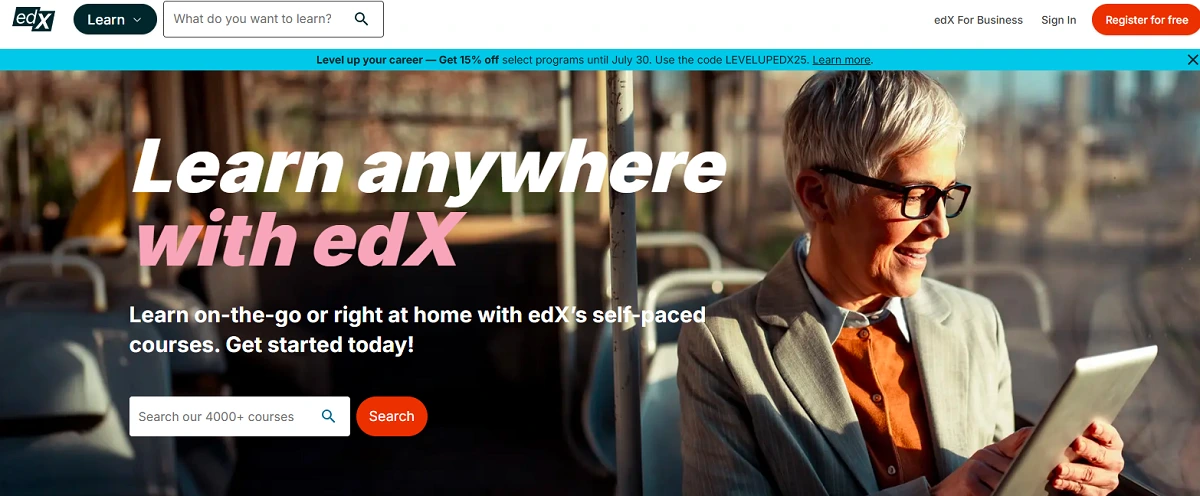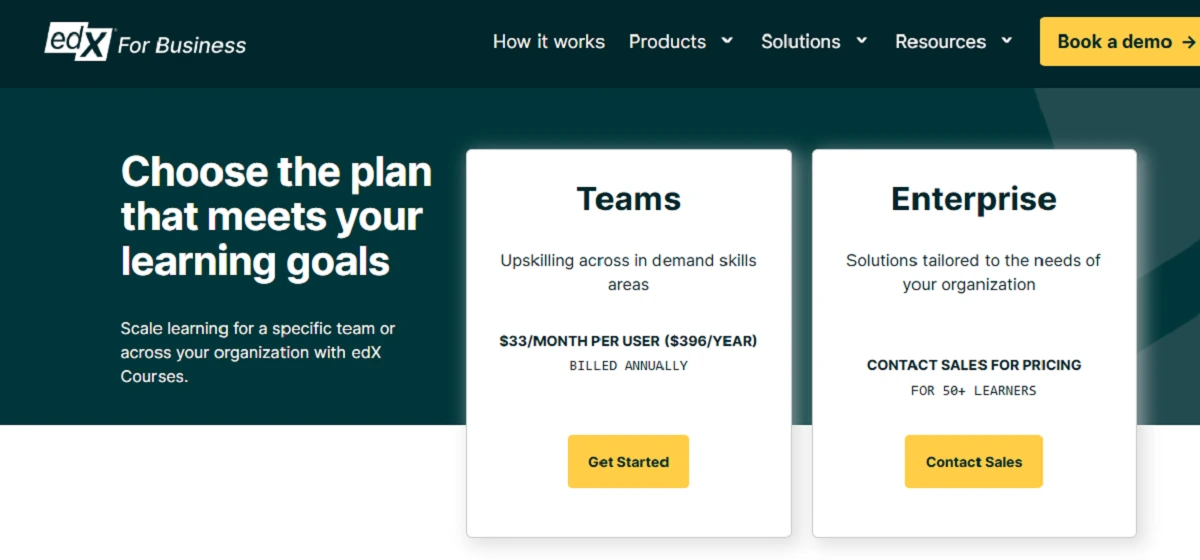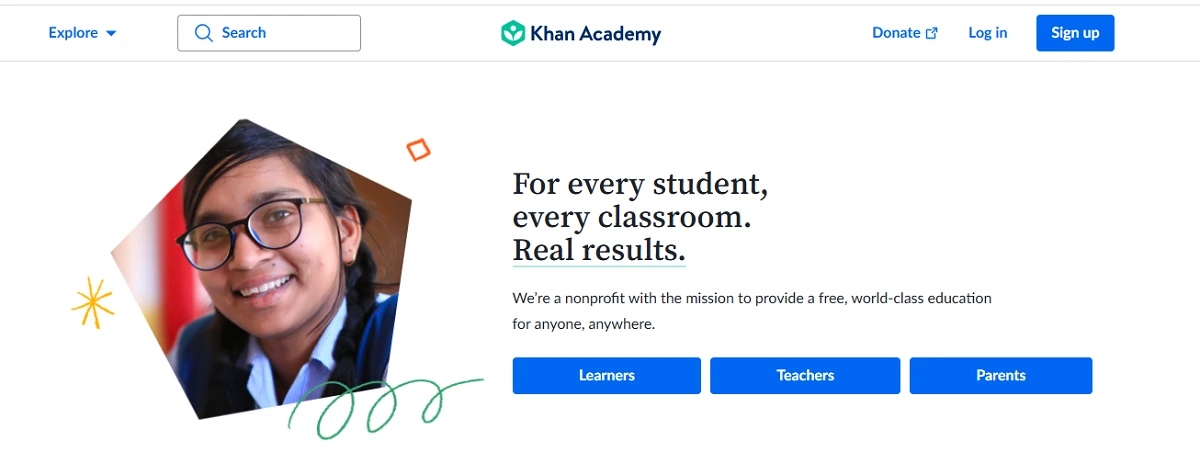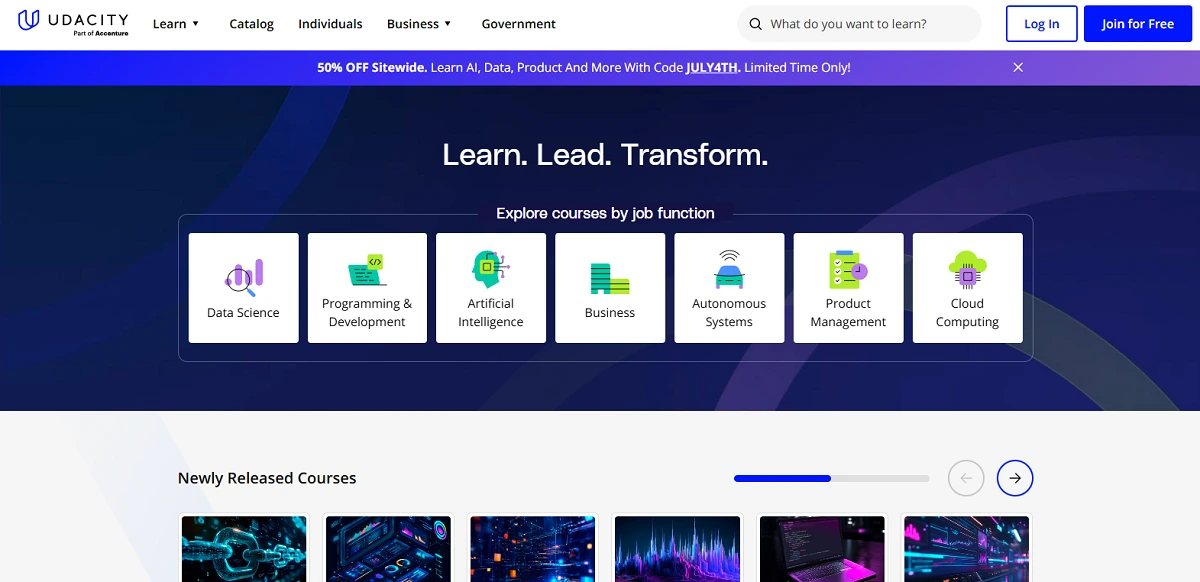edX is an online learning platform founded by Harvard and MIT to offer university-level courses and programs worldwide. It competes with other e-learning services by providing MOOCs, certificates, and even full degrees from top institutions. This article provides an in-depth look at edX’s reviews, pricing, and features in 2025, so students and parents can compare it with other tutoring and learning options and make an informed choice.

edX Reviews and Testimonials
Trustpilot – 1328 reviews, 1.4/5. Many users on Trustpilot complain about edX’s customer support and certificate policies. For example, one review called edX “scummy” for charging for certificates despite free content, and another said support only offered refunds rather than fixing issues. Positive reviews on Trustpilot are rare; the site notes issues like outdated content and lack of instructor interaction.
G2 (B2B site) – 118 reviews, 4.5/5. On G2, edX is rated highly. Reviewers praise the platform’s large catalog and partnerships with universities. One summary notes edX is a “fast-growing, open-source education platform”. Common pros: high-quality courses by Ivy League and other institutions, flexible self-paced learning, and a wide range of subjects. Cons mentioned include the audit version lacking some materials and occasional high costs of certificates.
GetApp (Gartner Digital Markets) – 18 reviews, 4.8/5. GetApp reviewers are very positive. For example, one user raved, “I love it! It is like going to university at home. I get access to amazing professors, great concepts, and … a nice certification at the end”. Another said edX is “highly relevant” with “diverse learning programs, university-level courses, [and] free learning options”. Common praises: top-quality professors and content, user-friendly interface, and free audit options. A few noted that some courses can be expensive and content variety is limited.
Google Play (Android app) – 110K reviews, 4.6/5. The edX mobile app is rated highly (4.6 stars). Users like having courses on the go. One user wrote, “I love edX and I’m looking forward to using it for many months. The app could use updates: quizzes are hard to see, and it needs better bookmarking”. In general, app reviews mention convenience of accessing courses anywhere, though some note minor UI issues.
edX Official Site – edX does not feature student reviews on its website. Its site highlights partners and course offerings, but we focus on independent reviews.
Is edX legit? Yes. EdX is widely regarded as a legitimate platform. It was created by Harvard and MIT and is now part of 2U, a major education tech firm. The Career Karma site explicitly states, “Yes, edX is legit…it hosts online university-level courses”. The mixed feedback comes from service issues (support, refunds), not from questions about authenticity. Since edX serves millions (86M learners worldwide) and is backed by real universities, it is not a scam.
edX’s reviews are mixed. Many users praise its high-quality academic content and free learning options. Others criticize high certificate fees, limited refunds, and occasional platform glitches. Overall, edX’s link with top universities lends it credibility, though customer experience (pricing and support) receives complaints.
edX Pricing

Pricing Range
edX allows free access (audit) to most course materials, but charges for official certificates and degree programs. Verified course certificates typically cost USD $50–$300. More advanced credentials are pricier: Professional Certificates run around $200–$2,500, MicroMasters programs about $600–$1,500, and full online Master’s degrees are in the $10,000–$25,000 range. For example, many entry-level courses offer certificate tracks for under $100, while specialization programs or MicroMasters can cost several hundred dollars. (See edX’s pricing details for exact figures.) If edX offered tutoring or homework help services (it primarily offers courses instead), the pricing is per course rather than per hour. Courses vary: shorter courses are cheaper, multi-course programs cost more. edX itself does not charge any extra commission per course; the listed price is paid directly to edX. Check edX’s official site for detailed pricing on specific programs.
What students say about edX pricing
Many learners feel edX’s courses are affordable for what you get, but some view the certificate prices as high. On forums (like Reddit), students complain that paid certificates seem “scummy” since course content can often be accessed free. Others note that compared to live tutoring (which can be $30–$100/hour in the US), edX courses at ~$50–300 each are a good deal for full course material and an accredited certificate. Overall, edX’s pricing is comparable to Coursera or Udemy: it offers many free courses (audit mode), and certificate fees similar to industry norms (e.g. Coursera charges about $49–99 per course). The key is that edX allows auditing without cost, so you only pay if you want a credential. Student feedback suggests edX is reasonable but watched for unexpected charges.
Hidden costs
edX has no hidden registration or monthly fees. You pay only for certificates or degree programs you choose. There is no membership or subscription required. One point to note: certificates must be paid for in advance of getting them. Also, if you enroll in a program of multiple courses, finishing the first course can cancel refunds on the rest. In general, aside from the advertised course fees, there are no extra required add-ons or cancellation fees. (Of course, re-taking a course after an expiration or missing deadlines would require repurchasing.) Users report the refund policy is strict: after 14 days of purchase or course start, no refunds are given. That is essentially the only “extra” condition to be aware of.
How edX’s pricing works
edX accepts major credit/debit cards (Visa, MasterCard, Amex, Discover) and PayPal for payments. Learners can enroll (upgrade) any time before a course deadline; many courses even let you start in audit mode and pay later if you decide to pursue the certificate (usually within a 14-day window). edX does not offer a flat subscription for all courses (unlike some competitors); each course or program is paid individually. However, edX sometimes runs promotions and has discounts. For example, edX has provided up to a 90% discount on verified certificates for those who apply and qualify, and offered one-time promo codes like ‘LEVELUPEDX25’ for 15% off. It also provides group or organization plans through its enterprise arm (for businesses) and a 20% military discount on certain programs. There are no standard student or senior discounts beyond these special offers.
Free Trial
edX does not have a conventional free-trial period for paid content. Instead, it offers free auditing of most courses indefinitely. In practice, you can freely explore course materials without payment. If you decide you want a certificate, you pay at that time (usually before a deadline). So while there’s no “7-day trial,” the audit option lets you essentially try courses for free before committing.
Refund policy
By edX policy, most paid courses allow refund requests within 14 days of enrollment or course start, whichever is later. After that, no refunds are given even if you cancel or finish early. The refund is per course – finishing one course in a multi-course program usually voids refunds for the rest. In practice, some students have complained that getting refunds is hard. For example, one Trustpilot review said “No refunds provided to the certificate program to which I was enrolled”. This suggests that while edX’s formal policy allows a 14-day refund window, in reality the company may push solutions like unenrollment instead of refund or may deny requests if conditions aren’t met. Be aware: edX requires you to request refund early (within 14 days) or you likely won’t get any money back.
edX Alternatives
Students look for alternatives when they want different pricing models, more interactive help, or varied content. For instance, someone might seek a live tutoring option or a platform with more vocational courses. Here we compare edX with other popular online learning services. Each alternative serves learning needs differently. Below is a summary of the top competitors and their pros/cons relative to edX.

- Coursera – Coursera partners with many universities (also Harvard/MIT) and companies to offer courses. It has a huge catalog and offers degree programs and specializations. Coursera has both free audit options and paid certificates. Unlike edX, Coursera offers a subscription plan (Coursera Plus: $399/year), giving unlimited access to many courses. Pros: wider course variety and subscription flexibility. Cons: subscription can be expensive if you only need one course. In G2 comparisons, Coursera’s subscription was listed as $399/year (vs edX’s no subscription). Both platforms are similar in quality, but edX is strictly partner-university content whereas Coursera includes many industry-branded courses (e.g. Google).

- Khan Academy – Khan Academy is completely free and focuses on K–12 and early college material (math, science, economics, test prep). All its content is “completely free”. Pros: no cost, excellent for foundational learning and exam prep, with practice exercises. Cons: It does not provide college-level or specialized courses like edX, and there are no certificates or college credit. If a student only needs basic math or science review, Khan Academy is great. But for university subjects and formal certificates, Khan Academy isn’t an alternative. Its user interface is simple and focused on self-practice, unlike edX’s lecture/course format.

- My Engineering Buddy (MEB) – MEB is a live tutoring/homework help service for STEM subjects. Pros: 1:1 personal attention, flexible scheduling, and expert help on specific problems. Students can get immediate answers on advanced math/engineering questions. According to reviews, MEB is easy to use (“easy to sign up”) and its tutors are “very helpful” and make “tough problems easy”. They charge per session (pay-as-you-go) instead of per course. Cons: It costs more per hour than edX’s free courses, and it focuses on STEM/higher math only (no courses in humanities or casual topics). Unlike edX’s self-study MOOCs, MEB is interactive tutoring. Trustpilot shows MEB at 4.7/5 stars, reflecting satisfaction. In short, MEB’s edge over edX is personalized help in complex subjects; edX’s edge is broad coursework and certificates.

- Udacity – Udacity offers “Nanodegree” programs primarily in tech fields (AI, programming, data science). It is very career-focused with real-world projects and mentoring. Pros: industry-relevant curriculum, built for job skills. Cons: Very expensive (about $249/month on average; no free audit) and limited to technical fields. In G2 comparisons, Udacity was noted as having no refunds and high monthly costs. Compared to edX, Udacity has fewer courses and is more costly, but it provides more one-on-one support and a career-focus. EdX offers more free content and academic courses, while Udacity is like a fast vocational bootcamp.
How it Works?
For Students
Students create a free account on edX and browse courses. edX’s website and app say you can register for free and access courses for every budget. You search by subject, university partner, or skill level. When you find a course, you enroll. You can choose to take it in “audit” mode (free) or pay to “upgrade” to a verified track. Auditing gives you access to videos and readings at no cost, while the paid track grants certificates and graded assignments. edX does not match you with a personal tutor. Instead, learning is through pre-recorded lectures, quizzes, and discussion forums. You can post questions on the course discussion board; instructors or classmates may answer, but it is not instant tutoring. Most edX courses are self-paced or have flexible deadlines, so you study on your own schedule. (Note: To get a full refund, any paid course must be dropped within 14 days of enrollment; otherwise, you proceed at your own pace.) No set class times or private sessions are required – you simply follow the course content and complete assignments by the deadlines.
For Tutors (Instructors)
edX’s instructors are usually university faculty, not individual freelance tutors. To teach on edX, one must generally be affiliated with a partner university or organization. A 2U/TechWiseInsider article explains that “to teach on edX, you typically need to be affiliated with one of their partner institutions”. In practice, this means professors or authorized staff propose courses through edX’s partnership program. If you represent a university or organization interested in creating courses, edX has a “Partner with us” page for more information. The basic steps are: (1) be part of a recognized institution, (2) contact edX via their partnership page to propose a course or program, (3) work with edX to design the course, and (4) publish it on the platform. edX does not allow independent tutors to simply sign up and set their own rates – the platform’s courses are created by its educational partners. For more details, see edX’s “Partner with us” information, which guides institutions on how to offer courses on edX.
edX: Company Information
edX was launched in May 2012 by MIT and Harvard as a nonprofit MOOC platform. Initially co-founded by MIT’s Anant Agarwal, it aimed to make elite education accessible globally. (In 2021 edX became part of 2U and now operates as a public benefit corporation. edX was founded by leaders at Harvard and MIT (e.g. MIT Professor Anant Agarwal). It grew out of a shared vision of expanding higher education via the internet. edX’s mission is to eliminate the “back row” of education by giving everyone access to quality learning. In other words, its goal is to make top-tier education universally available. The company’s vision statement (as part of parent 2U) is to create a world “where learners everywhere have access to expert-led educational experiences and flexible pathways”. EdX is headquartered in Cambridge, Massachusetts, USA. It operates globally – over 86 million learners worldwide have joined edX courses. According to company data, edX (through 2U) has nearly 96 million registered users and 250+ partner institutions as of 2025. It has a large staff (around 980 employees across all continents). Its content comes from 160+ global partners (universities and institutions) and covers thousands of courses and programs.
Comparison with My Engineering Buddy
My Engineering Buddy (MEB) offers live tutoring in STEM subjects, which is very different from edX’s self-paced courses. MEB excels in personalized attention – each session is tailored to the student’s exact questions and learning pace. Many students praise MEB’s expert tutors for making hard problems “easy to understand” and note how simple it is to sign up and start sessions. In contrast, edX shines in broad course selection and academics, while MEB shines in hands-on help. Users often use edX for course learning and use MEB for homework help. Testimonials highlight MEB’s advantages: for example, one review says “Ashish’s help with my physics homework has been amazing”. Overall, MEB’s strengths are in-demand STEM tutoring, competitive hourly pricing, and a high satisfaction rate. Students should consider MEB if they need complex problem solving and 1:1 support, whereas edX is great for structured university courses.
Customer Support and Policies
EdX support gets mixed marks. Officially, edX offers email help and has FAQs, but many users report slow or generic responses. If you have a problem, edX typically suggests unenrolling for a refund instead of fixing the issue, which frustrates students. The refund/guarantee is simply their 14-day refund window; there is no money-back guarantee beyond that. By contrast, My Engineering Buddy is reported to have more responsive support – they provide direct contact channels (e.g. WhatsApp) and quick replies. Trustpilot shows MEB’s support and service are highly rated (97% satisfaction), suggesting MEB generally responds faster and more personally than edX’s large help desks. In summary, edX’s policy is strict and support can be impersonal, whereas MEB advertises attentive support (as per user reviews).
Global Reach and Localization
EdX is designed for a global audience. Its platform is used worldwide (86M+ learners) but is primarily English-based. Course lectures are usually in English (some partners provide subtitles or translations), and the website is global but not heavily localized for specific countries. By contrast, My Engineering Buddy explicitly serves regions like the US, UK, Canada, Australia, and Gulf countries. MEB’s tutors can often accommodate different accents and time zones for those regions. EdX’s mobile app and website work globally, but it does not offer multilingual support beyond course translations. In terms of accessibility, both can be accessed anywhere, but MEB highlights certain markets (for example, it mentions Gulf countries) where it operates.
edX’s future plans
EdX (through its parent 2U) is expanding its offerings, especially in high-demand fields. A 2025 press release announced new AI-focused programs with Oxford (e.g., an “AI-Driven Business Transformation” executive course) launching on edX. This shows edX is introducing advanced AI and tech courses for professionals. 2U also notes that edX now connects about 96 million learners and 250+ institutions, implying continued growth. In future plans, edX likely will keep adding more degree programs and corporate partnerships (as 2U invests in enterprise training). The platform may also integrate more technology (such as learning analytics or AI-driven recommendations) to personalize learning, although details aren’t public yet. Overall, edX aims to keep broadening its catalog (with new bootcamps and executive courses) and use technology to improve access.
FAQs About edX
How does edX compare to My Engineering Buddy? EdX is a course platform (recorded lectures, quizzes, certificates) and MEB is a live tutoring service. EdX offers self-paced classes from universities, whereas MEB provides one-on-one STEM help. EdX has academic breadth; MEB gives targeted homework support.
Is edX really free or do I have to pay? Most edX content can be accessed for free by auditing. You only pay if you want a certificate or graded assignments. Certificate tracks generally cost tens to a few hundred dollars, but auditing and financial aid make learning essentially free.
Can I earn college credit through edX? Some edX programs do offer credit. For example, MicroBachelor’s programs give real college credits that transfer to degree programs. Regular courses on edX do not automatically count for credit, but partner universities may accept them if you enroll in a degree.
Does edX offer academic degrees? Yes. EdX hosts full online degrees (bachelor’s and master’s) in partnership with universities. For instance, it has 12 accredited online Master’s programs at partner schools. Completing one grants a real degree from the university.
Do I get an official certificate from edX? Yes, if you pay for the verified track. edX certificates come from the partner institution (e.g. “HarvardX”) so they carry university branding. Employers often accept them as evidence of completed coursework. edX itself is legitimate (founded by Harvard/MIT), so certificates are not fake. Still, the value depends on how an employer views online credentials.
How do I get a refund on edX? You can request a refund within 14 days of paying for a course or of the course start date. To do so, go to your edX dashboard and unenroll. After 14 days or after earning a certificate, you cannot get your money back. In practice, some users have reported difficulty with refunds if they miss the deadline. So it’s crucial to decide within the 14-day window.
What if I need help during a course? EdX courses have discussion forums where you can ask questions. Instructors, TAs, or other students may answer. There is no live tutor, but community support. Additionally, edX help pages and support tickets are available if you have technical issues.
What is the difference between edX and Coursera? Both offer online courses from universities. A key difference: Coursera offers a subscription plan (Coursera Plus) for $399/year, giving unlimited access to many courses, while edX charges per course (no subscription). Coursera often partners with companies for certificates; edX’s courses are strictly academic (from schools). Both allow auditing free, but edX tends to have more flexible start times. In pricing, edX certificates and Coursera certificates are in a similar range, but Coursera’s subscription can save money if you take many courses.
Is edX accredited? EdX itself isn’t an accreditor, but its university partners are accredited. The courses and degrees you earn on edX are accredited by the issuing school. Wikipedia notes that edX was founded by Harvard/MIT and is a recognized platform, so its credentials come from those institutions, not from edX as a company.
Conclusion
In summary, edX’s main strengths are its high-quality university courses and global reach. It offers excellent academic content, many courses for free, and formal certificates from reputable schools. Its weaknesses include relatively high certificate fees, a strict refund policy, and some user complaints about support. For students needing advanced, one-on-one help (especially in engineering or math), My Engineering Buddy provides a compelling alternative. MEB is praised for personalized tutoring and expert instructors, which can make complex homework far easier. In other words, edX is great for broad structured learning, while MEB is ideal for hands-on guidance. Advanced STEM students should consider MEB for difficult subjects and live assistance, with edX serving as a respected platform for self-driven coursework.
******************************
This article provides general educational guidance only. It is NOT official exam policy, professional academic advice, or guaranteed results. Always verify information with your school, official exam boards (College Board, Cambridge, IB), or qualified professionals before making decisions. Read Full Policies & Disclaimer , Contact Us To Report An Error
